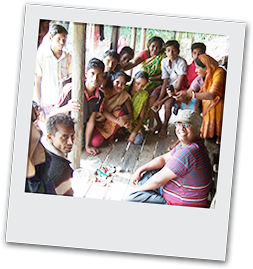Listening as first step to save the Sundarbans’ tigers
Rezvin fell in love with nature when she was a child, always watching the playful birds in her garden, listening to their songs. After studying zoology, she was proud to join WildTeam, an organization dedicated to protecting the Sundarbans and the magnificent tigers living in it. The Sundarbans is an amazing, huge mangrove forest in Bangladesh. Beautiful rivers meander and host dolphins, fish, crabs and rare crocodiles. During the black nights there is a magic silence. The sky is full of twinkling stars. Just before daybreak, the bright green colors of the trees come back. Birds start singing. Thirsty deer drink water from their ponds. Somewhere in the deep dark forest the mighty tiger hides.
 Rezvin is passionate about nature conservation and eager to learn. Rezvin tells us cheerfully: “We were working on our strategy and asked ourselves: whose behavior has to change to reach our goals? The answer: the villagers living next to the Sundarbans! The population has exploded. Illegal logging and poaching of deer –the favorite meal of tigers – shrank the home of these magnificent animals. More and more often, a hungry tiger enters a village to grab a goat, cow or even a villager. Every year, people are wounded, maimed and killed.
Rezvin is passionate about nature conservation and eager to learn. Rezvin tells us cheerfully: “We were working on our strategy and asked ourselves: whose behavior has to change to reach our goals? The answer: the villagers living next to the Sundarbans! The population has exploded. Illegal logging and poaching of deer –the favorite meal of tigers – shrank the home of these magnificent animals. More and more often, a hungry tiger enters a village to grab a goat, cow or even a villager. Every year, people are wounded, maimed and killed.
So when a hungry tiger enters a village, people panic, corner it and brutally bludgeon it to dead with sticks. All there is left of the king of the forest is a slaughtered bloody mess. The crowd cheers and the tiger killers are treated as heroes.
Our team realized that as close we feel to nature, so distant we feel to the villagers. We asked ourselves: How can you change the behavior of people you don’t understand? We cannot apply brutal force. There are many, many villages and we are a small team. The change must come from their own hearts and minds!

So our team embarked on a boat through the Sundarbans. For days and days, we visited many villages and talked with the habitants. This was new for us. We did not tell them: ‘don’t kill tigers’ – as many conservationists have done before. The villagers already know it is forbidden. But they fear and hate these deadly predators. How would you feel when your beloved mother is killed, ripped apart and eaten by an enormous cat?
In the beginning it was really difficult for most of us to just listen, open mindedly, without using the word ‘Tiger’. As soon as you say the T word, the shutters go down and the atmosphere grows icy cold. My boss Iqbal took the lead and immediately sat down on the ground with a few villagers, breaking the ice. He is warm-hearted, smart and is a marketing and communication specialist. He understood right away that to start a meaningful conversation, you have to ask open questions, without judging. Smiling he asked the villagers: ‘How is it like to live in such special and beautiful part of our country? How do you make a living? What are important festivities for your village? Which stories do your grandparents tell? How do you feel about the Sundarbans?’
The results amazed our team. We expected that the villagers would see us as enemies. But because we listened openly, with full respect, – not mentioning tigers! – they opened their hearts and minds for us. They shared their stories and believes. They told us what is important for them in life.

We went from village to village and after a few days of listening, we really understood how to connect with the people. Now we also knew which activities could spark the change. Looking back, this was the crucial step which led to our recent successes.
Learn more from the full story
Go to the free course ‘Storytelling for conservation action’ to learn tips from the full story of Rezvin. We can give away that her team found an innovative solution to protect the tigers in close cooperation with the villagers, the forest guards and local governments.

